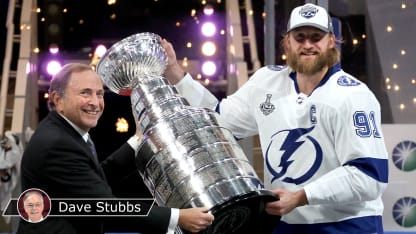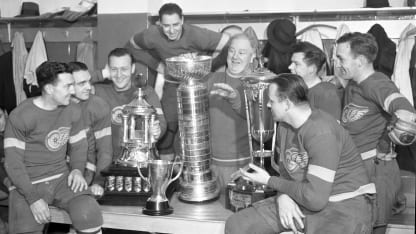Detroit Red Wings coach and GM Jack Adams and members of the 1936-37 team celebrate their Stanley Cup championship.
NHL president Frank Calder wanted to present the trophy to Jack Adams, the Red Wings coach and general manager, but Adams was so overcome with emotion, his team having successfully defended its 1935-36 championship, that he fainted in a Detroit Olympia dressing room. Calder finally brought the trophy into the winners' room to hand it over, Young among the celebrants after the Red Wings had defeated the New York Rangers in five games.
Jean Beliveau was the next captain in street clothes, the Canadiens legend having taken a shot off his right ankle in practice before the clinching game of their five-game 1968 semifinal against the Chicago Black Hawks. Beliveau played through the pain to help eliminate Chicago but was badly hobbled the next day with an injury that was diagnosed as a bad bruise.
On crutches, his right leg in a cast from his foot to his knee, Montreal Canadiens captain Jean Beliveau speaks to fans in the Montreal Forum following the team's 1968 championship win.
"It was really painful in the third period and overtime [of Game 5]," Beliveau said on the eve of the Stanley Cup Final against the second-year St. Louis Blues. "They didn't find any crack with X-rays right after the game but two days later I could hardly walk. It's a little better today but there will have to be a lot more improvement before I can skate again."
Beliveau gave it a try, dressing for Game 1 of what would be a four-game sweep of the Blues, but he played just a few shifts in the first period before warming the bench the rest of the night.
Within a couple of days, his right leg was placed in a cast, from his foot to his knee, his season finished. Wearing a suit and on crutches, Beliveau spoke to a joyous Montreal Forum crowd after the Stanley Cup had been presented to veteran forward Ralph Backstrom by NHL president Clarence Campbell.
In street clothes, Montreal Canadiens captain Yvan Cournoyer kisses the Stanley Cup following its 1977 presentation by NHL president Clarence Campbell.
Cournoyer would twice in three years be out of uniform for Montreal's Cup-clinching victories, surgery on his back in 1977 and again in 1979 leaving him on the sidelines.
Nicknamed "The Roadrunner" for his blazing speed, Cournoyer was unable to play a single game in the 1977 postseason, the Stanley Cup accepted that year at Boston Garden by acting captain Serge Savard after the Canadiens' four-game sweep of the Bruins.
Cournoyer returned to lead the Canadiens to the 1977-78 championship, but would play 15 games in 1978-79, a second operation on his back ultimately ending his NHL career. Savard, who would assume the captaincy for two seasons upon Cournoyer's retirement, again accepted the trophy, this time in Montreal after the Canadiens defeated the Rangers in five games in the Final to give them a run of four straight titles.
Calgary Flames co-captain Lanny McDonald with the Stanley Cup in 1989. At right, he's joined by fellow co-captains Tim Hunter (left) and Jim Peplinski, who didn't play in decisive Game 6 against the Canadiens.
And most recently, perhaps with an asterisk, there are the 1989 Calgary Flames, who were co-captained by Lanny McDonald, Jim Peplinski and Tim Hunter.
Only McDonald played against the Canadiens in Montreal on May 25, 1989, the Flames defeating the home team in Game 6 and winning the Stanley Cup. But Peplinski and Hunter came out onto Forum ice to join their team's celebration, NHL president John Ziegler having presented the Cup.
McDonald, the future Hall of Famer who today is chairman of the Toronto shrine, went out in style. With 500 NHLregular-season goals and 1,111 games played, he scored that night in Calgary's 4-2 win to help lift the Flames to their only championship to date, then hung up his skates for good.
Photos: Getty Images/HHoF Images



